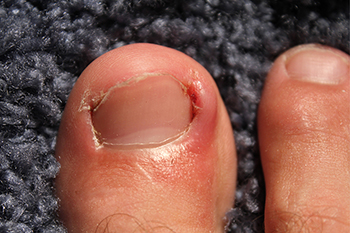6650 Frankford Ave
Philadelphia, PA 19135

The first sign of an ingrown toenail is pain that continues to get worse. This will be followed by swelling and redness as the nail continues to become embedded into the skin surrounding it. The chief cause of an ingrown toenail is the improper cutting of a toenail, most often on the big toe. In some cases, an ingrown toenail can become infected, especially if the skin around the toenail is cut. This can occur during a pedicure where the skin is accidentally pierced. Wearing shoes with a narrow toe box can make the formation of an ingrown toenail worse and cause more pain. Other common causes of ingrown toenails are improperly fitting shoes, long nails that are rounded, an injury, and genetics. People with diabetes, and those who have fungal infections, are overweight or have toe deformities are further at risk of an ingrown toenail. If an ingrown toenail is causing increased pain or showing signs of infection, it is suggested that you consult a podiatrist for safe and antiseptic treatment.
Ingrown toenails may initially present themselves as a minor discomfort, but they may progress into an infection in the skin without proper treatment. For more information about ingrown toenails, contact John M. Fanelly, DPM of Northeast Philadelphia. Our doctor can provide the care you need to keep you pain-free and on your feet.
Ingrown Toenails
Ingrown toenails are caused when the corner or side of a toenail grows into the soft flesh surrounding it. They often result in redness, swelling, pain, and in some cases, infection. This condition typically affects the big toe and may recur if it is not treated properly.
Causes
You are more likely to develop an ingrown toenail if you are obese, have diabetes, arthritis, or have any fungal infection in your nails. Additionally, people who have foot or toe deformities are at a higher risk of developing an ingrown toenail.
Symptoms
Some symptoms of ingrown toenails are redness, swelling, and pain. In rare cases, there may be a yellowish drainage coming from the nail.
Treatment
Ignoring an ingrown toenail can have serious complications. Infections of the nail border can progress to a deeper soft-tissue infection, which can then turn into a bone infection. You should always speak with your podiatrist if you suspect you have an ingrown toenail, especially if you have diabetes or poor circulation.
If you have any questions, please feel free to contact our office located in Philadelphia, PA . We offer the newest diagnostic and treatment technologies for all your foot care needs.